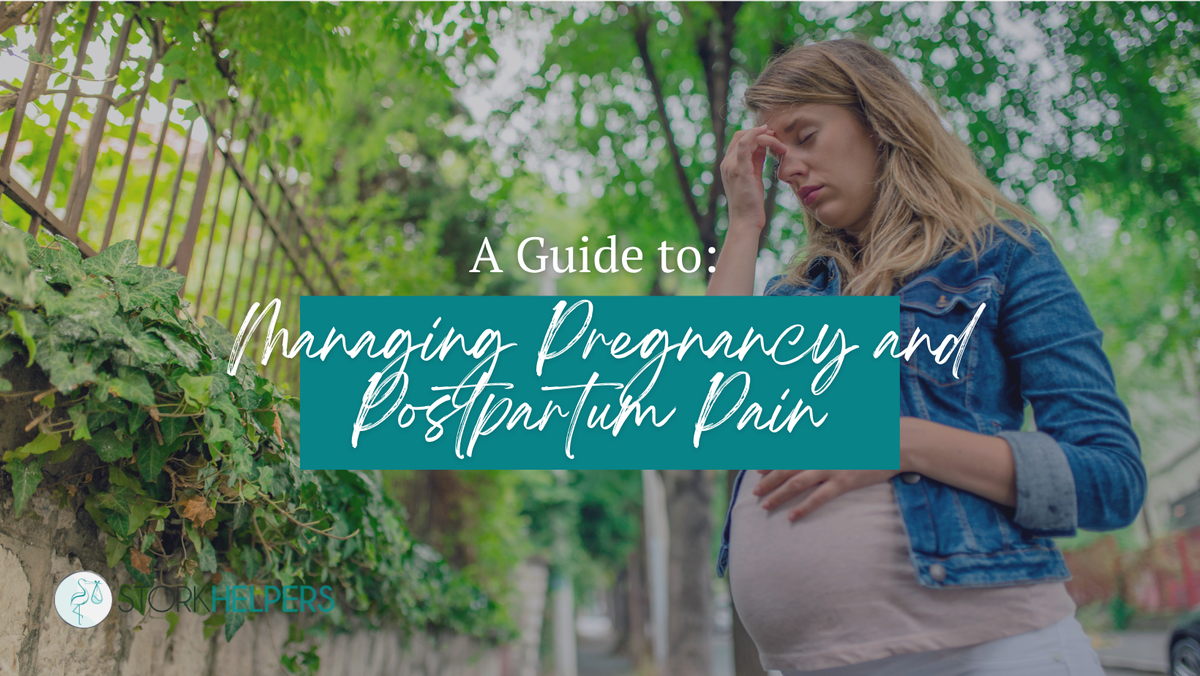A Guide to Managing Pregnancy and Postpartum Pain

All over the world, mamas and soon-to-be-mamas know that pain is one of the most challenging parts of pregnancy and the postpartum period.
Many people simply accept that pain is a part of pregnancy and that mama just has to grit her teeth and deal with it.
The vast majority of mamas will indeed feel pain leading up to and after the birth of their babies, but there are ways that mamas can lessen their pain.
With a few proactive steps, mamas can lessen the pain caused by pregnancy.
The body changes during pregnancy and these changes can cause pain in several different areas of the body.
In this post, we will talk about the changes your body goes through, how those changes cause pain, and strategies to help you control pain and avoid injury during pregnancy.
Changes Your Body Goes Through During Pregnancy
During pregnancy, you can expect many changes from your body.
Your body has to work hard to accommodate your growing baby and it will have to make changes in short order as your baby’s body develops.
The most noticeable difference will be your growing belly. In addition, your body will unleash a flurry of hormones to help prepare itself for your upcoming labor and delivery.
The hormones your body produces and releases during pregnancy help make your labor and delivery smoother, but they can affect the rest of your body in undesirable ways.
Here are three hormones that are active in your body during this time.
Progesterone
Relaxes the muscles of the uterus during birth. It also relaxes the smooth muscles of the intestines, which can result in constipation.
Estrogen
Plays a prominent role in milk production, meaning an influx of estrogen enlarges the breasts. This can cause changes to posture, which causes mama to lean back, placing extra strain on her lower back.
Relaxin
As the name would suggest, relaxin relaxes the ligaments in the pelvis and softens the tissue of the cervix. This leads to decreased stability in all the joints, which in turn can cause poor posture, and back and pelvic pain. Relaxin stays in the body for up to 12 months postpartum.
Why Do These Changes Hurt Me?
As your baby grows and develops, you will often notice a steady increase in pain.
This is caused by the changes in your own body that we discussed above. Weakening muscles are one of the biggest reasons for increased pregnancy pain.
Low back pain, hip pain, and pelvic pain are the most common pains you will encounter during pregnancy.
When your muscles weaken from bodily changes, other areas of the body must pick up the slack and this leads to pain.
Tight hamstrings, a tilted pelvis, weak glutes, and short/tight pelvic floor muscles all result from pregnancy changes and lead to pain during and after pregnancy.
How to Control Pregnancy Pain
There are three things you can do to ebb the pain you feel during pregnancy.
- Maintain proper posture
- Focus on proper body mechanics
- Exercise
Let’s take a closer look at each of these strategies.
Maintain Proper Posture
Bodily changes often lead to poor posture in pregnant women, which in turn leads to increased pressure on your lower back and hips.
Be sure to check your posture at least once every thirty minutes.
Try this:
- Stand with your feet pelvis width apart
- Release tension in your glutes
- Stack your ribs over your pelvis
A few posture checks per day will give your muscles relief and will reduce your pain after a few days.
Proper Body Mechanics
Your center of gravity has changed and because of this, your body mechanics will be abnormal.
Injuries in pregnant or postnatal women often occur when they lift, bend, or twist, to complete tasks.
Be aware of how you are moving during these tasks and always go slow whenever you are bending or twisting a sensitive area.
When lifting always:
- Bend at the knees
- Keep your back straight
- Lift with your legs
- Tighten your stomach muscles and exhale as you lift
- Carry the weight close to your body
Exercise
Exercise is important as it keeps your muscles strong and limber.
Many women think that stretching is the only way to combat pregnancy pain. However, this is not always true, and some stretches can cause more harm than good.
Let’s look at hip pain, for example.
Hip pain is extremely common for women during and after pregnancy.
During pregnancy, your glutes and hamstrings tend to weaken, and your hips are forced to compensate. Focusing on exercises that specifically target strengthening the glutes and hamstrings is highly effective at reducing hip pain.
Better Pregnancy Support with Stork Helpers
Pregnancy is not easy. Your body is going to go through many changes, and with those changes will come pain.
This pain can linger well into the postpartum period and often leads to exhaustion and despair.
Managing pain during pregnancy is possible and the strategies explained in this post have been proven effective.
One of the biggest factors in helping a mama manage the pains of trials of pregnancy is ensuring that she has a proper support network.
Choosing the right doula will go a long way toward helping mama get the support she so badly needs.
If you want the best in terms of pregnancy support, look no further than Tamara at Stork Helpers.
Tamara is always there for you to ensure that you know all your options and that the final decisions are made by you.
Always listening, never judging, Tamara is here for you.
For better support during your pregnancy, reach out to Stork Helpers today!

